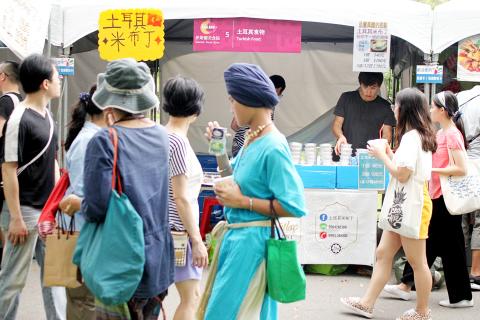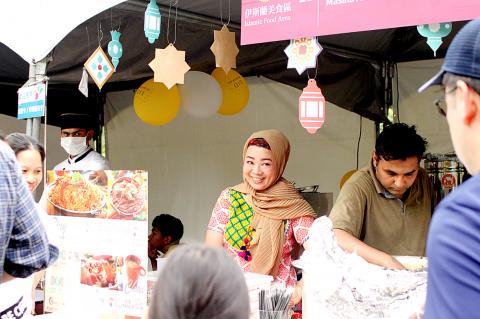The Islamic Cultural and Halal Food Festival may not be the first thing that comes to mind when one thinks of festive year-end events in Taipei. But the open-air festival at Daan Forest Park promises to have something for the entire family.
This weekend, more than 70 vendors offering Islamic food, crafts and cultural experiences will set up shop along the park’s pathways. Visitors can try out Arabic calligraphy and henna and shop for wares drawn from around the Muslim world.
It will be a rare opportunity to catch many of Taiwan’s small, online businesses in the flesh: La Femme Dromadaire stocks lamps, figurines and burnous (Berber tunics) hand-made in Tunisia; Camel Hump Stay will bring Moroccan leather bags and shoes; and From Syria offers up delicate woven earrings and pouches made by female refugees from the war-torn country.

Photo: Davina Tham, Taipei Times
Visitors can also look forward to a picnic with freshly-served food and drink from a range of Indian, Turkish and Moroccan vendors. Some unusual treats to look out for include food from North Africa, intense brews from Saturn Landing Turkish Coffee and baklava from the Taiwan outpost of Zalatimo Sweets, a 159-year-old Jordanian sweetsmaker.
The festival is co-organized by the Chinese Muslim Association (中國回教協會) and Taipei City Government.
■ The Islamic Cultural and Halal Food Festival takes place tomorrow and Sunday, 10am to 5pm

Photo: Davina Tham, Taipei Times
■ Daan Forest Park (大安森林公園), 1, Xinsheng S Rd Sec 2, Taipei City (台北市新生南路二段1號)

April 14 to April 20 In March 1947, Sising Katadrepan urged the government to drop the “high mountain people” (高山族) designation for Indigenous Taiwanese and refer to them as “Taiwan people” (台灣族). He considered the term derogatory, arguing that it made them sound like animals. The Taiwan Provincial Government agreed to stop using the term, stating that Indigenous Taiwanese suffered all sorts of discrimination and oppression under the Japanese and were forced to live in the mountains as outsiders to society. Now, under the new regime, they would be seen as equals, thus they should be henceforth

Last week, the the National Immigration Agency (NIA) told the legislature that more than 10,000 naturalized Taiwanese citizens from the People’s Republic of China (PRC) risked having their citizenship revoked if they failed to provide proof that they had renounced their Chinese household registration within the next three months. Renunciation is required under the Act Governing Relations Between the People of the Taiwan Area and the Mainland Area (臺灣地區與大陸地區人民關係條例), as amended in 2004, though it was only a legal requirement after 2000. Prior to that, it had been only an administrative requirement since the Nationality Act (國籍法) was established in

Three big changes have transformed the landscape of Taiwan’s local patronage factions: Increasing Democratic Progressive Party (DPP) involvement, rising new factions and the Chinese Nationalist Party’s (KMT) significantly weakened control. GREEN FACTIONS It is said that “south of the Zhuoshui River (濁水溪), there is no blue-green divide,” meaning that from Yunlin County south there is no difference between KMT and DPP politicians. This is not always true, but there is more than a grain of truth to it. Traditionally, DPP factions are viewed as national entities, with their primary function to secure plum positions in the party and government. This is not unusual

US President Donald Trump’s bid to take back control of the Panama Canal has put his counterpart Jose Raul Mulino in a difficult position and revived fears in the Central American country that US military bases will return. After Trump vowed to reclaim the interoceanic waterway from Chinese influence, US Defense Secretary Pete Hegseth signed an agreement with the Mulino administration last week for the US to deploy troops in areas adjacent to the canal. For more than two decades, after handing over control of the strategically vital waterway to Panama in 1999 and dismantling the bases that protected it, Washington has